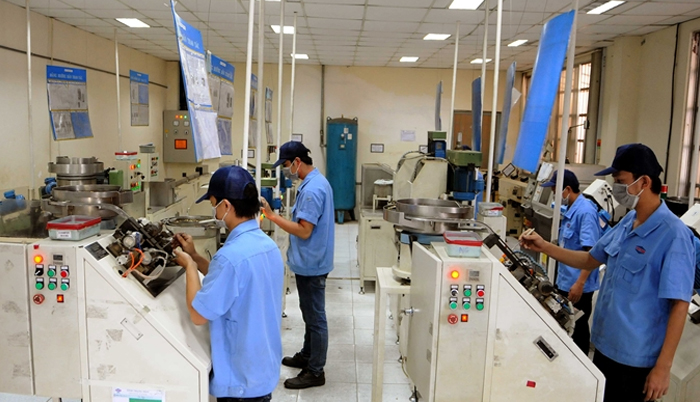![]() Home > Vietnam
Home > Vietnam
New Industrial Revolution Will Be Digitally-Centered

Employees of the HCM City-based Dien Quang Lamps JSC work on a compact bulb production line. Viet Nam is urged to strengthen market-based reforms and invest in education and training in order to take advantage of opportunities arising from the next digitalisation-driven production revolution. | PHOTO: VNA/VNS (An Hieu)
![]() June 19th, 2016 | 08:45 AM |
June 19th, 2016 | 08:45 AM | ![]() 1254 views
1254 views
HA NOI
Việt Nam should strengthen market-based reforms and invest in education and training in order to take advantage of opportunities arising from the next digitalisation-driven production revolution, experts have said.
At the workshop, “The Next Production Revolution and its policy implications” jointly held by the Ministry of Foreign Affairs and the Organisation for Economic Co-operation and Development (OECD), yesterday in Hà Nội, experts said that the world was on the brink of the next production revolution with profound technological breakthroughs, while Việt Nam was embarking on the new stage of development and integration with accelerated industrialisation from 2016 to 2020.
Besides opportunities, the next production revolution posed challenges to Việt Nam particularly the challenge of further lagging behind, according to the experts.
It is time for policy-makers in Việt Nam to acquire a better understanding of the digital revolution to make the best of the revolution’s opportunities in its early stages and to speed up industrialisation and modernisation, experts at the OECD said.
They were optimistic that Việt Nam would turn into a high-income country in the next four decades.
Deputy minister of Foreign Affairs Bùi Thanh Sơn said that innovative thinking was critical for Việt Nam to move forward while the country was losing its competitiveness in low-cost labour.
Trần Đình Thiên, director of Việt Nam Institute of Economics, said Việt Nam signed free trade agreements with the world’s giant economies such as the European Union, Korea and the US.
“Amidst rapid integration coupled with the approaching next production revolution, if Việt Nam went on the right path, the country could take a giant leap,” Thiên said.
Kensuke Tanaka, head of the OECD Development Centre’s Asia Desk, said at the conference that strengthening market-based reforms, SOE reforms and reforms to education and training to meet demand for skilled labour were essential.
OECD, on its website, says that the spread of global value chains, the increasing importance and mainstreaming of knowledge-based capital, and the rise of the digital economy, are ushering in the “next production revolution”.
However, a number of policy challenges must be tackled to enable the next production revolution, the website says.
The world went through three industrial revolutions, according to the World Economic Forum. The first was in 1784 using water and steam power to mechanise production. The second was in 1870 using electric power to create mass production, and the third took place in 1969 using electronics and information technology to automate production. Now a digital revolution was in the making.
EDUCATION REFORM
Investing in education and training was now the clear choice for Việt Nam to be able to grasp opportunities from the next production revolution, the OECD experts said at the conference.
Alistair Nolan, senior policy analyst at the OECD’s Directorate for Science, Technology and Innovation said that as the digital revolution and globalisation were bringing radical changes to the world of work, education and training systems need constant attention.
It was also important to improve the link between supply and demand in the labour market, which was a key factor for success, the experts stressed.
Source:
courtesy of VIET NAM NEWS
by VNS
If you have any stories or news that you would like to share with the global online community, please feel free to share it with us by contacting us directly at [email protected]